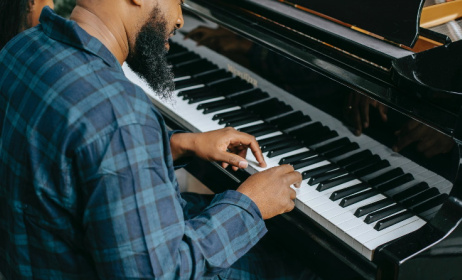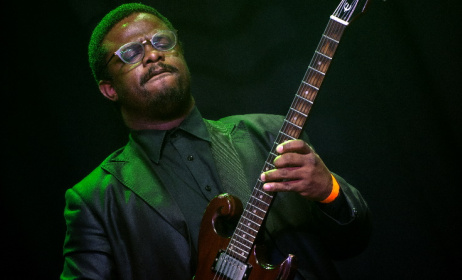Wenham Chechamba: Malawi’s living musical history
Musical traditions are strong in the rolling hills of Southern Malawi. Elaborate ritual dancing and singing are common, while vestiges remain of an earlier era.
 Malawian musician and educator Wenham Chechamba. Photo: Ilan Moss.
Malawian musician and educator Wenham Chechamba. Photo: Ilan Moss.
One of these vestiges is Wenham Chechamba, a musician from Blantyre, southern Malawi’s biggest city and the country’s commercial capital. Still going strong at 80 years old, Chechamba is a multi-instrumentalist, composer, sought-after music teacher and somewhat of a beloved national treasure. He began playing music professionally 60 years ago – first in the army under British colonial rule and then as a full-time musician and teacher.
In many ways, Chechamba is a piece of living musical history. He is a link to the colonial and regional influences that make up Malawian music and a bridge between modern urban sounds and rural traditions. His playing and style harks back to a bygone era, when Malawians began exploring their own music in the wake of colonialism.
“When I started playing music, we were playing songs for white people since Europeans relied on Africans for music,” says Chechamba. “When Malawi became independent [in 1964], people began to demand their own music.”
Chechamba is proficient in American jazz (he does a mean Louis Armstrong impression), he also plays traditional Malawian music, singing in Chichewa, the national language. He is a master of guitar and piano, but it is one instrument in particular that brought me to him: the 5-string banjo.
Yes, banjo. Definitely not the first instrument one would think to find in the mountains of Southern Africa. But as Chechamba explains below, the banjo is very much Malawian.
How did a West African instrument, originally used by 17th century slaves in the New World make it "back" to Southern Africa? Chechamba explains it all in this video and plays a few Chichewa tunes using a two-finger picking style. Filmed at his music school/house in the Blantyre neighborhood of Chilomoni.
The banjo’s role in Malawian music is typical of the country’s porous musical borders. Early last century, Malawians working the mines of South Africa picked up the instrument from the Boers, whose pre-war dance bands often consisted of banjo, concertina and guitar. Returning workers brought these instruments back to Malawi and quickly integrated them into the country’s repertoire. By the 1950s, banjo-led bands were quite common in the South.
Unfortunately little commercial recordings remain of this sound, but Chechamba’s lilting and heavily syncopated banjo picking offers a glimpse into this past style. Homemade banjo players can still be found in rural areas of Southern Malawi, such as a musician from Zomba region.
Electric guitar dominates modern Malawian music. The bouncy guitar-led pop music heard throughout the country is similar to Congolese soukous. Chechamba plays a different, older style in this video, filmed again in the courtyard of his Chilomoni School.
Chechamba is also a gifted jazz pianist, and has played at hotels and resorts for years. In this video, he plays and sings a Malawian number. Filmed at the Blantyre Synod music school.
Chechamba teaches music on the grounds of the Blantyre Synod, site of the original Scottish Mission that founded the city in the 19th century. Chechamba also runs a music school at his home in Chilomoni. He teaches local children on a whole range of instruments, conveniently painted on the wall of his home's entrance.
I was introduced to Chechamba by Malawian journalist and editor Clifton Kawanga, who brought me to the Chilomoni School as the sun was setting. As a life-long admirer of the field recordings of Alan Lomax, I was clearly tickled pink to be recording an elderly banjo player in his moonlit courtyard, distant sounds of dogs barking and children singing. But this wasn’t in remote Appalachia, this was Malawi in the 21st century and the only light in the courtyard came from a small lamp… and Clifton’s smartphone, who live-tweeted the whole session. Clifton also wrote about the experience in the BNL Times, giving some more contexts on Chechamba’s role in Malawian music.
Chechamba has composed several orchestral pieces, combining European and Malawian influences. The problem – he hasn’t found an orchestra or the musicians to play his pieces. He has hope though. A local church recently acquired some instruments and Chechamba hopes to try out at least five of his compositions.
Here’s hoping the world will be able to hear these compositions soon.
* Originally published in January 2014 on ScrollKit.

































Comments
Log in or register to post comments